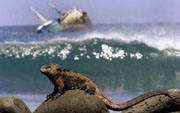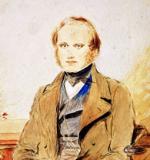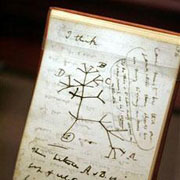VOA慢速英语2011--Great Thinkers: Charles Darwin and Evolution
时间:2019-01-12 作者:英语课 分类:2011年VOA慢速英语(十一)月
Explorations - Great Thinkers: Charles Darwin and Evolution
STEVE EMBER: Welcome to Explorations, in VOA Special English. I'm Steve Ember. This week, Barbara Klein and I tell about one of the most influential 1 thinkers in science history.
Charles Darwin developed the theory of how living things develop from simpler organisms over long periods of time. That theory is known as evolution through natural selection.
(MUSIC)
How do new kinds of life come into existence? For much of recorded history, people have believed that organisms were created. Few people believed that living things changed. What process could make such change possible?
These were some of the questions Charles Darwin asked himself over years of research in botany, zoology 2 and geology. He was not the first person to ask them. His own grandfather, Erasmus Darwin, believed that species evolved. And others, like the French naturalist 3 Jean-Baptiste Lamark, had proposed ways this could happen. But it was Darwin who identified and explained the process, natural selection, that causes life to evolve.

A marine 4 iguana 5 sunbathes 6 on rocks of San Cristobal Island in the Galapagos Archipelago. The strange animals of the Galapagos made Darwin wonder about how species develop and change.
BARBARA KLEIN: Charles Darwin was born in Shrewsbury, England on February twelfth, eighteen-oh-nine. His father Robert Darwin was a doctor. Charles' mother Susannah Darwin was the daughter of the famous potter, Josiah Wedgwood. She died when Charles was only eight years old.
Young Charles was intensely interested in the natural world from an early age. But his father wanted him to be a doctor.
At age sixteen, Charles was sent to study medicine at the University of Edinburgh. But he did not like it. He found medical operations especially horrible. He later went to Cambridge University. His father now hoped that Darwin would become a clergyman. But at Cambridge, Charles continued to follow his own interests. There, he met John Henslow, a plant scientist and clergyman. The two became friends.
STEVE EMBER: John Henslow suggested that Charles Darwin take the unpaid 7 position of naturalist for a trip on the British ship H.M.S. Beagle. It sailed around the world from eighteen thirty-one to eighteen thirty-six. The main goal was to make maps of the coastline of South America. The British government paid for the voyage. But another purpose of the trip was to collect scientific objects from around the world.
(MUSIC)

A painting of young Charles Darwin
BARBARA KLEIN: The Beagle’s first stop was one of the Cape 8 Verde Islands near the coast of Africa. There, Darwin noted 9 that levels of rock extending high above the sea contained the fossil remains 10 of shells. He thought that this was evidence that the bottom of the ocean had been lifted up by powerful geological forces over long periods of time.
The Beagle continued to the coast of South America. In Valdivia, Chile, Darwin experienced an earthquake. He collected examples of plants and animals. He also collected the fossil remains of animals that had disappeared from the Earth.
But it was on the Galapagos Islands off the coast of Ecuador that Darwin found creatures that made him wonder about how species develop and change. There, he saw giant tortoises and noted that the reptiles 11 were different on each island.
He collected birds, each with different beaks 12. Later, after he had returned to England, he would be shocked to find that these very different birds were all finches. Darwin found lizards 13 called iguanas 14 that lived on land and ones that fed in the sea.
Darwin noted that all these species were similar to those found in South America. But, they all had differences, or adaptations, that helped them survive in the environment of the Galapagos Islands.
STEVE EMBER: Darwin sent much of what he collected back to England on other ships the Beagle met along the way. By the time he returned to England in October of eighteen thirty-six, he was already a well known geologist 15 and naturalist. Within a few years, he would be accepted into scientific organizations like the Geological Society and the Royal Society.
Darwin moved to London to be near other scientists. He wrote a new version of the book about his travels. He also edited works of others about the things he had collected on his trip. Darwin also agreed to write several books including the "Zoology of the Voyage of the H.M.S. Beagle." But in eighteen thirty-seven, the pressure of the work caused his health to suffer. He developed problems with his heart.
BARBARA KLEIN: Charles Darwin had poor health much of his life. He suffered headaches and problems with his skin and stomach. No one was able to find out what disease he may have had during his lifetime. Recently, some experts have suggested that he might have become infected with a tropical disease. Others suggest Darwin’s health problems were caused by conflict in his mind over his theory. Poor health would later force him to leave London and settled at Down House near Kent, England.

A copy of Charles Darwin's notebook containing his idea of an evolutionary 16 tree. The notebook is in the American Museum of Natural History in New York City.
Darwin began work on a series of secret notebooks containing his thoughts about the evolutionary process. He began to think that animals developed from earlier, simpler organisms. As early as eighteen thirty-seven, he imagined this process as a tree with branches representing new species. Unsuccessful branches ended. But successful evolutionary changes continued to form new branches.
STEVE EMBER: Charles Darwin’s personal life was also expanding. In eighteen thirty-nine, he married Emma Wedgwood, his cousin. He told her his ideas about how species evolve over time -- what he called the transmutation of species.
Emma did not agree with her husband. But the two had a strong and happy marriage. They had ten children together. Seven of them survived.
(MUSIC)
BARBARA KLEIN: Charles Darwin read widely and sought ideas from other fields of study. He was influenced by Thomas Malthus’ work, "An Essay on the Principle of Population" written in seventeen ninety-eight. Malthus argued that populations are always limited by the food supply.
Darwin would later say that this work caused him to realize the struggle for limited resources was a fact of life. He said small changes took place in individual animals. Changes that helped them survive would continue. But those that did not would be destroyed. The result of this would be the formation of new species.
The British philosopher Herbert Spencer described this struggle as "survival of the fittest." But biologists use the term “natural selection” to describe the evolutionary process.
STEVE EMBER: Charles Darwin developed his idea slowly over more than twenty years. He was concerned that he would lose the support of the scientific community if he revealed it. He wrote to his friend, botanist 17 Joseph Hooker, that speaking about evolution “was like confessing a murder.”
It was not until eighteen fifty-eight that Darwin was forced to release his theory to the public. Another naturalist, Alfred Russel Wallace, had independently written a paper that contained ideas similar to Darwin's concerning evolution. Wallace had reached these ideas from his studies on islands in the western Pacific Ocean.
With help from Darwin's friends, the two naturalists 18 presented a joint 19 scientific paper to the Linnean Society of London in July of eighteen fifty-eight. At first there was little reaction.
Then, in November, eighteen fifty-nine, Darwin released the results of all his work on evolution. The book was called "On the Origin of Species by Means of Natural Selection, or the Preservation 20 of Favoured Races in the Struggle for Life." It was an immediate 21 success.
BARBARA KLEIN: The "Origin of Species" was praised by many scientists. But religious leaders denounced it. For them, evolution opposed the explanation of creation found in the book of Genesis in the Bible. Today, almost all scientists accept the theory of evolution. But many non-scientists are unsure about whether humans evolved over millions of years. In the United States, public opinion studies have shown that less than half the population believes in evolution.
STEVE EMBER: Natural selection does not explain everything about why species evolve. Darwin did not know about Gregor Mendel’s work on heredity. And the discovery of genetics and D.N.A. molecules 22 took place long after his death. Yet, Darwin theorized in a world much different from the one we know. That is why scientists today wonder at the depth of his knowledge and the strength of his arguments.
Charles Darwin died on April nineteenth, eighteen eighty-two. He was buried at Westminster Abbey, in London, among other heroes of Britain.
(MUSIC)
BARBARA KLEIN: This program was written and produced by Mario Ritter. I’m Barbara Klein.
STEVE EMBER: And I’m Steve Ember. You can find a link to Charles Darwin's writings and research at our Web site, voanews.cn. Join us again next week for Explorations in VOA Special English.
- He always tries to get in with the most influential people.他总是试图巴结最有影响的人物。
- He is a very influential man in the government.他在政府中是个很有影响的人物。
- I would like to brush up my zoology.我想重新温习一下动物学。
- The library didn't stock zoology textbooks.这家图书馆没有动物学教科书。
- He was a printer by trade and naturalist by avocation.他从事印刷业,同时是个博物学爱好者。
- The naturalist told us many stories about birds.博物学家给我们讲述了许多有关鸟儿的故事。
- Marine creatures are those which live in the sea. 海洋生物是生存在海里的生物。
- When the war broke out,he volunteered for the Marine Corps.战争爆发时,他自愿参加了海军陆战队。
- With an iguana,you really don't have to say surprise.惊喜两字已经不足以形容这只鬣鳞蜥了。
- I'm going to turn on my computer and make a movie starring my pet iguanadj.打开计算机准备制作一部关于我的宠物蜥蜴的电影。
- Young lady bikini sunbathes on top of HDB carpark: Isn't this dangerous? 女子身穿比基尼在组屋顶楼停车场晒日光浴:不危险吗?
- Doctors work excessive unpaid overtime.医生过度加班却无报酬。
- He's doing a month's unpaid work experience with an engineering firm.他正在一家工程公司无偿工作一个月以获得工作经验。
- I long for a trip to the Cape of Good Hope.我渴望到好望角去旅行。
- She was wearing a cape over her dress.她在外套上披着一件披肩。
- The local hotel is noted for its good table.当地的那家酒店以餐食精美而著称。
- Jim is noted for arriving late for work.吉姆上班迟到出了名。
- He ate the remains of food hungrily.他狼吞虎咽地吃剩余的食物。
- The remains of the meal were fed to the dog.残羹剩饭喂狗了。
- Snakes and crocodiles are both reptiles. 蛇和鳄鱼都是爬行动物。 来自《简明英汉词典》
- Birds, reptiles and insects come from eggs. 鸟类、爬虫及昆虫是卵生的。 来自《现代汉英综合大词典》
- Baby cockatoos will have black eyes and soft, almost flexible beaks. 雏鸟凤头鹦鹉黑色的眼睛是柔和的,嘴几乎是灵活的。 来自互联网
- Squid beaks are often found in the stomachs of sperm whales. 经常能在抹香鲸的胃里发现鱿鱼的嘴。 来自互联网
- Nothing lives in Pompeii except crickets and beetles and lizards. 在庞培城里除了蟋蟀、甲壳虫和蜥蜴外,没有别的生物。 来自辞典例句
- Can lizards reproduce their tails? 蜥蜴的尾巴断了以后能再生吗? 来自辞典例句
- The geologist found many uncovered fossils in the valley.在那山谷里,地质学家发现了许多裸露的化石。
- He was a geologist,rated by his cronies as the best in the business.他是一位地质学家,被他的老朋友们看做是这门行当中最好的一位。
- Life has its own evolutionary process.生命有其自身的进化过程。
- These are fascinating questions to be resolved by the evolutionary studies of plants.这些十分吸引人的问题将在研究植物进化过程中得以解决。
- The botanist introduced a new species of plant to the region.那位植物学家向该地区引入了一种新植物。
- I had never talked with a botanist before,and I found him fascinating.我从没有接触过植物学那一类的学者,我觉得他说话极有吸引力。
- Naturalists differ much in determining what characters are of generic value. 自然学者对于不同性状决定生物的属的含义上,各有各的见解。 来自辞典例句
- This fact has led naturalists to believe that the Isthmus was formerly open. 使许多自然学者相信这个地蛱在以前原是开通的。 来自辞典例句
- I had a bad fall,which put my shoulder out of joint.我重重地摔了一跤,肩膀脫臼了。
- We wrote a letter in joint names.我们联名写了封信。
- The police are responsible for the preservation of law and order.警察负责维持法律与秩序。
- The picture is in an excellent state of preservation.这幅画保存得极为完好。
- His immediate neighbours felt it their duty to call.他的近邻认为他们有责任去拜访。
- We declared ourselves for the immediate convocation of the meeting.我们主张立即召开这个会议。